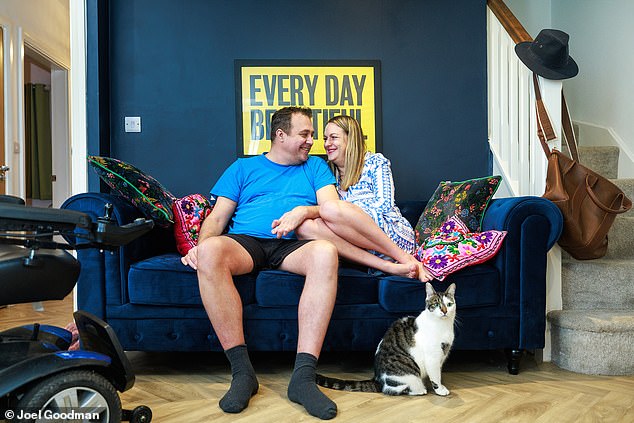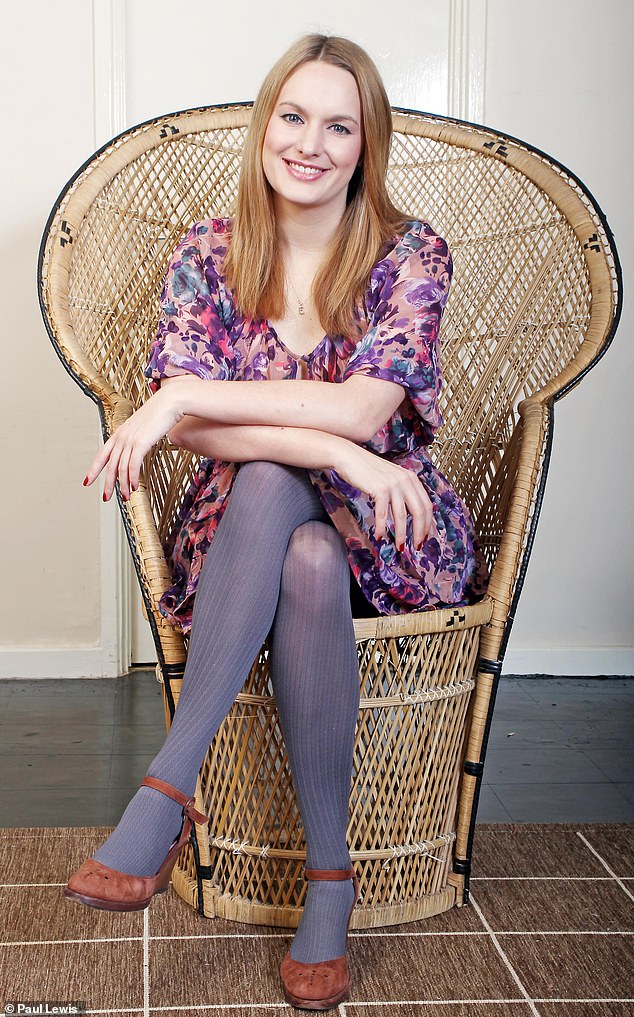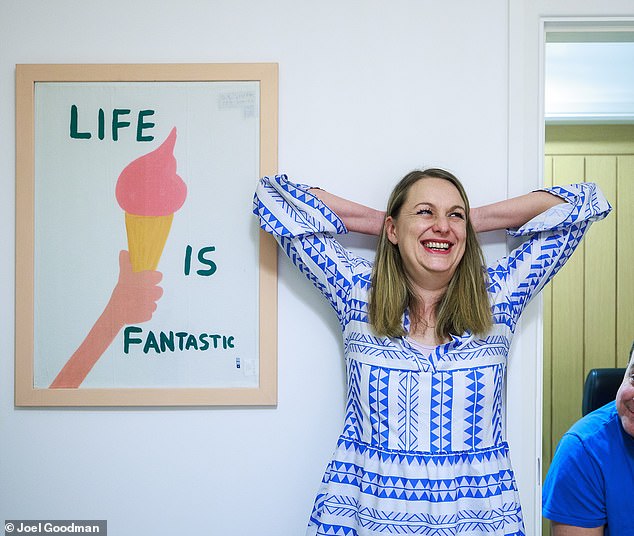I was 29 the first time I had an orgasm. I was, to put it delicately, alone at the time. And it was a revelation.
It was as if I had opened a compartment of life that had been hermetically sealed and now, suddenly, many things made sense.
This must be why everyone makes such a fuss about sex, I thought.
Until that night, when I cancelled plans to spend time alone in bed, the idea of touching my own body made me uncomfortable.
During my teens and early twenties, I felt a deep dislike for my appearance, which meant that I disliked my body and didn’t feel like I deserved to feel pleasure.
Writer Erica Crompton now feels in harmony with her body after spending her teens and twenties estranged from her sexuality.

Erica Crompton at home with her partner, Paul, who has helped her feel comfortable in her own body.
I suffered for several years from life-ruining eating disorders, including an addiction to laxatives that further disconnected me from my physical self.
In my late teens, I had a few boyfriends, but I never really enjoyed it. My priority when it came to romantic interests had always been security (someone who wouldn’t betray or abandon me) rather than a man I was attracted to.
That meant that he had never really felt desire. Needless to say, he had never climaxed.
But then, at 29, I broke up with a man I’d never had good sex with. I thought enough was enough. I was going to have an orgasm… and I was going to do it myself.
I read everything there was to read about self-pleasure, sex, and orgasms, and set aside an entire afternoon and evening to focus on my body.
After a bit of exploring, I discovered which parts of my body were particularly sensitive and what pressure felt good.
It took some trial and error, but I finally had my first orgasm.
It was liberating and I couldn’t believe it had taken me so long to allow myself to experience such a powerful feeling.
I spent the next few weeks discovering my physical self and, for the first time in my life, giving myself permission to feel something good.

A recent study of 24,000 American adults ages 18 to 100 found that women experience an orgasm about half the time they have sex, while men say they climax 70 to 85 percent of the time.
And I’m proud to say that since then, I climax virtually every time I have sex, although there’s usually foreplay involved.
I have been with my current partner for three years and our intimacy has never left me unsatisfied, something I know cannot be said for most women.
The precious time I spent getting to know myself in my late 20s helped me learn what works and what doesn’t. I know the right rhythms, positions, and nerve endings, and most importantly, I’m not afraid to ask for what I want.
I’m not alone in my late sexual awakening.
Surveys show that around a fifth of women believe masturbation is “shameful” or “wrong”. Experts have suggested that this could have something to do with the prevailing culture that focuses more on male sexual pleasure than female.
“The kind of sex we see in movies or porn is usually more focused on male arousal, fast thrusts and a race to the finish line,” says sex educator Mangala Holland.
‘Female bodies tend to respond better to more foreplay and a longer period of arousal.’
But I think our inability to understand our bodies is what drives one of the biggest — and most unfortunate — discrepancies between the genders: the orgasm gap.
A recent study of 24,000 American adults ages 18 to 100 found that women experience an orgasm about half the time they have sex, while men say they climax 70 to 85 percent of the time.
This argument is often dismissed with biological arguments. Some say that the difference between male and female anatomy means that many women simply cannot climax during intercourse and that there is not much that can be done about it.
But Holland says that by regularly exploring your body, including the entrance to the vaginal canal, you can learn subtle positions that make the experience with a partner much more pleasurable.
For example, if the nerve endings are towards the back of the body, placing a pillow under the lower back to raise the pelvis can help stimulate the necessary areas.
What’s more, self-awareness gives you more power to ask your partner to touch specific, sensitive areas, perhaps with a hand or even a toy.
I have found that practicing this level of honesty in intimate moments fosters healthy communication outside of the bedroom.
These types of conversations have made me feel empowered to ask my partner for extra time or emotional support when I need it.
If you already feel “one” with yourself, but you still find it difficult to achieve dizzying pleasures during sex, don’t worry, nothing is wrong with you.
Some medications and underlying health problems can affect your libido and desensitize the nerves in the intimate area.
Looking back, I think my reluctance to please myself in my teens and twenties was a result of a difficult childhood that made me feel unworthy and not good enough.
And then, at the age of 22, I suffered a psychotic episode, which I have written about before in The Mail.
It marked the beginning of several years of mental health issues, for which I have since received treatment.
The ordeal left me feeling even more disconnected from my body, and sex was last on my priority list.
“Some women may experience orgasm blocks for psychological reasons, including past emotional trauma as well as negative messages about sex they’ve learned from their family or religion,” says sexual health expert Dr. Michael Krychman.
‘While a journey of sexual self-exploration is important, a sexual health professional may also be necessary.’
Now, at 44, I’m happy to say that I feel more comfortable with my body than ever before. Plus, I have 15 years of orgasms under my belt and many more to come.


